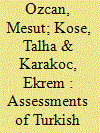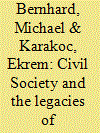|
|
|
Sort Order |
|
|
|
Items / Page
|
|
|
|
|
|
|
| Srl | Item |
| 1 |
ID:
139254


|
|
|
|
|
| Summary/Abstract |
Using original public-opinion polls and elite interviews conducted in 2012, this article analyzes the perceptions of Turkish foreign policy regarding the Arab Uprisings and the Syrian conflict in three Middle Eastern countries, Egypt, Iraq and Iran. It finds that ethnic, sectarian and religious groups in these three countries vary significantly in their views on Turkish foreign policy regarding both the Arab Uprisings and the Syrian conflict, although the same identity-related factors have a less salient effect at the elite level. The findings also suggest that the intersection of ethnicity and sect shapes people's attitudes toward Turkish foreign policy in Iran and Iraq. Sunnis, except for Kurds in Iran and Iraq, tend to have a positive view of Turkish foreign policy, while Shia Turkomans in Iraq tend to have a negative one.
|
|
|
|
|
|
|
|
|
|
|
|
|
|
|
|
| 2 |
ID:
080168


|
|
|
|
|
| Publication |
2007.
|
| Summary/Abstract |
The literature on civil society in postcommunist regimes highlights its weakness as compared with civil society in other democracies. In this article the authors make a general argument on how different patterns of antecedent dictatorship affect the development of civil society across a range of democracies. They examine the slow emergence of two behaviors associated with a robust civil society-participation in organizational life and in protest-and explain variation across countries as a function of regime history. They draw their individual-level data from the World Values Survey and analyze the behavior of over forty-one thousand citizens from forty-two democracies. Using methods of hierarchical linear modeling to control for both national-level and individual-level factors, the authors find that different types of dictatorship and variation in their duration produce different negative legacies for the development of civil society
|
|
|
|
|
|
|
|
|
|
|
|
|
|
|
|
| 3 |
ID:
120750


|
|
|
|
|
| Publication |
2013.
|
| Summary/Abstract |
As political trust literature has focused on its political and economical determinants, the linkage between ethnicity and trust in domestic and international institutions has been largely overlooked with a few notable exceptions. This study aims to underline this linkage and offer several hypotheses to test them in Turkish context. Using the European Social Survey conducted in 2008, this study finds that, though Kurds have low levels of trust in domestic institutions, their distrust is not uniform across all institutions. Second, it finds that Kurds are pro-international institutions; that is, compared to Turks, they hold higher trust in international institutions. Finally, it finds that, contrary to the studies on the winner/loser debate in long-standing democracies, winners in general and Kurdish winners, those who voted for the Justice and Development Party, the winning party in the 2007 election-are not distinguishable in their level of trust in political institutions from the rest of society.
|
|
|
|
|
|
|
|
|
|
|
|
|
|
|
|
|
|
|
|
|